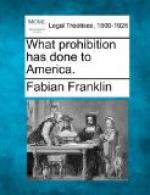in the case which accentuate its unreasonableness
and unfairness. In the American village and small
town, the use of alcoholic drinks presents almost no
good aspect. The countryman sees nothing but the
vile and sordid side of it. The village grogshop,
the bar of the smalltown hotel, in America has presented
little but the gross and degrading aspect of drinking.
Prohibition has meant, to the average farmer, the abolition
of the village groggery and the small-town barroom.
That it plays a very different part in the lives of
millions of city people—and for that matter
that it does so in the lives of millions of industrial
workers in smaller communities—is a notion
that never enters the farmer’s mind. And
to this must be added the circumstance that the farmer
can easily make his own cider and other alcoholic drinks,
and feels quite sure that Prohibition will never seriously
interfere with his doing so. Altogether, we have
here a case of one element of the population decreeing
the mode of life of another element of whose circumstances
and desires they have no understanding, and who are
affected by the decree in a wholly different way from
that in which they themselves are affected by it.
Many other points might be made, further to emphasize
the monstrosity of the Prohibition that has been imposed
upon our country. Of these perhaps the most important
one is the way in which the law operates so as to
be effective against the poor, and comparatively impotent
against the rich. But this and other points have
been so abundantly brought before the public in connection
with the news of the day that it seemed hardly necessary
to dwell upon them. My object has been rather
to direct attention to a few broad considerations,
less generally thought of. The objection that
applies to sumptuary laws in general has tenfold force
in the case of National Prohibition riveted down by
the Constitution, and imposed upon the whole nation
by particular sections and by particular elements of
the population. A question of profound interest
in connection with this aspect of Prohibition demands
a few words of discussion. It has been asserted
with great confidence, and denied with equal positiveness,
that Prohibition has had the effect of very greatly
increasing the addiction to narcotic drugs. I
confess my inability to decide, from any data that
have come to my attention, which of these contradictory
assertions is true. But it is not denied by anybody,
I believe, that, whether Prohibition has anything
to do with the case or not, the use of narcotic drugs
in this country is several times greater per capita
than it is in any of the countries of Europe—six
or seven times as great as in most. Why this
should be so, it is perhaps not easy to determine.
The causes may be many. But I submit that it is
at least highly probable that one very great cause
of this extraordinary and deplorable state of things
is the atmosphere of reprobation which in America
has so long surrounded the practice of moderate drinking.




